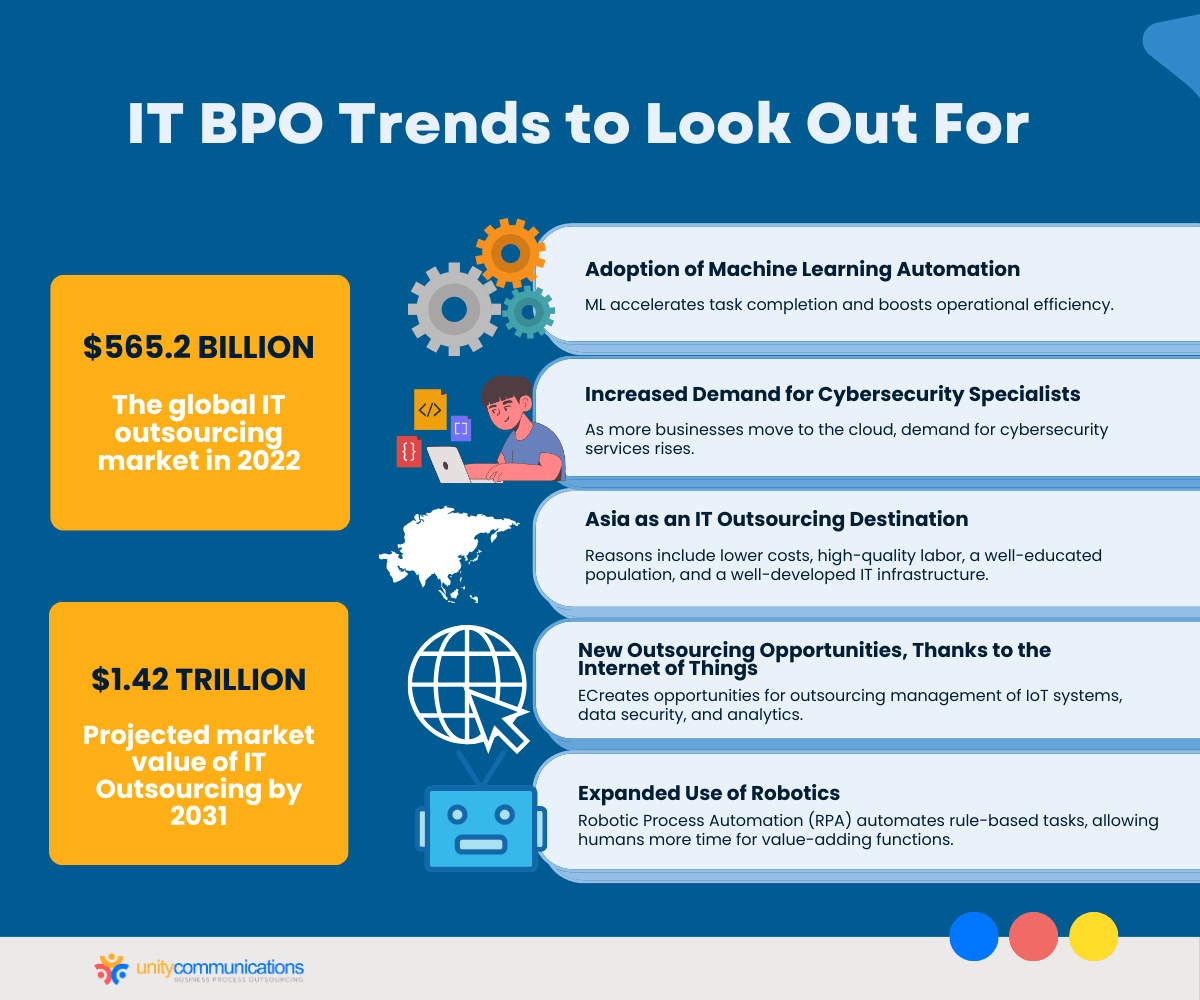Table of Contents
The role of information technology (IT) is changing, requiring innovative strategies as today’s businesses continue to move online and towards cloud solutions. Customers expect more from brands, and business process outsourcing (BPO) companies can help by offering more than legacy service models.
By outsourcing non-core business functions, businesses can concentrate on core competencies while maximizing cost savings and efficiency.
But what exactly is the future of BPO in the IT industry? That is the question we aim to explore in this article. We also discuss key trends and opportunities for BPO in the IT industry.
What Is BPO in the IT Industry?

BPO in the IT industry covers the functions that do not fall under the scope of a company’s core competency, such as customer service call centers, human resources (HR), and supply chain management. A third-party provider manages, operates, and oversees the outsourced non-core functions based on agreed-upon metrics.
Unlike other industries where BPO gained immediate popularity, the IT sector was slower to adapt to the model of work. Many saw IT operations as a cost center rather than a revenue producer.
However, the role of IT has shifted due to the rise of digital transformation and online migration. Unlike before, IT delivers technology services and is a strategic partner that helps companies generate revenue and drive growth, hence the rise of BPO in the industry.
Companies that successfully implement outsourcing transition plans maximize business growth with IT outsourcing. To achieve this goal, one must first ask what BPO services are available in the IT industry.
Here are some commonly outsourced work and functions:
- Help desk support includes basic customer support tasks such as troubleshooting issues, creating new accounts, and resetting forgotten passwords.
- Data entry and processing involve capturing, storing, and processing data. The data involved can be anything from financial transaction records to customer information.
- Customer relationship management (CRM) manages customer and client relationships. It includes campaign management, lead generation, and customer segmentation.
- Application development and management involve developing, testing, and implementing new applications. It also covers supporting and managing existing apps.
- IT infrastructure management pertains to managing a company’s IT system and infrastructure, whether on-premises or cloud-based.
- Business continuity and disaster recovery assist companies in recovering from and planning for business disruptions that system failures or natural disasters might cause.
The IT industry is constantly changing, and the types of BPO services have also evolved. Still, the future of the BPO industry in this digital age remains bright, with demands for the services above only growing as businesses rely more on technology to minimize overhead costs.
IT BPO Trends to Look Out For

Now that you know what BPO is, let us discuss the trends for BPO in the IT industry. The global IT outsourcing market was valued at $565.2 billion in 2022. It could generate $1.42 trillion by 2031, expanding at a 9.3% compound annual growth rate (CAGR) from 2023 to 2031.
What are the future BPO trends to look out for in the IT industry? According to various market research studies, here are a few trends to expect:
Widespread Adoption of Machine Learning (ML) Automation
ML is a subset of artificial intelligence (AI) where computers learn without being programmed. ML has many uses, some of which significantly benefit outsourcing.
AI and ML will have major roles in accelerating task completion and boosting overall operational efficiency for data entry, predictive maintenance, and after-sales service support in the future. ML helps BPO companies improve service quality and optimize operations. It allows them to quickly detect problems and respond with solutions.
Increased Demand for Cybersecurity Specialists
As more businesses move to the cloud, the demand for cybersecurity services will rise. The business landscape has reached a point where cybersecurity is too difficult to manage internally and moves too fast for most companies. The complexity of implementing, integrating, and managing cyber defenses exposes many to financial and operational consequences.
BPO firms that provide cybersecurity solutions will be popular. More service providers will also focus on this area in the coming years.
Favorable View of Asia as an IT Outsourcing Destination
Countries such as the Philippines, India, and China are the world’s top outsourcing destinations due to their cost-effective and talented BPO workers. As more businesses outsource IT functions, these locations will add more talent to their roster. Here are other reasons the three countries remain top competitors:
- Lower cost of labor than in the United States and the United Kingdom
- High-quality labor and a well-educated population
- Well-developed IT infrastructure
New Outsourcing Opportunities, Thanks to the Internet of Things (IoT)
The Internet of Things (IoT) covers devices such as sensors, appliances, cars, and even clothing connected to the Internet. Being connected enables them to exchange data and communicate with each other.
IoT has created new opportunities for companies planning to hire IT outsourcing services. For instance, businesses can offload the management of their IoT systems and other individual components, such as data security and analytics.
Expanded Use of Robotics
The implementation of robotic process automation (RPA) will continue to grow at an explosive rate. RPA automates and performs rule-based tasks typically accomplished by humans. It can handle recurring activities such as data entry and invoice processing.
The increased automation of repetitive tasks gives humans more time to work on value-adding functions such as relationship-building, strategy development, and decision-making.
Benefits of BPO in IT
The first step in reaping the benefits above is understanding IT BPO. Companies can hire a full-scale third-party IT team or fill select roles with external workers to support an existing IT department. Accordingly, this allows companies to concentrate on more significant issues and let small businesses level the playing field.
Here are some expected benefits of IT BPO:
- Reduced labor costs. Maintaining IT in-house is expensive, not to mention that it involves a perpetual learning curve for employees. BPO, especially offshore outsourcing, helps reduce labor costs by 70%.
- Controlled IT costs. Outsourcing IT allows companies to budget effectively by removing fixed costs and paying per use.
- Better experience. Third-party IT professionals have more experience solving issues than an in-house team, often requiring additional research and trial and error. The effect is a better user experience.
- Quick implementation of new projects. A reputable BPO company has the resources to implement new projects immediately, unlike an internal team, which might take weeks or months. Quality BPO services bring years of experience, saving you money and time.
- Level playing field. Most startups and small businesses cannot match the in-house services of large companies. Outsourcing can help small organizations level the playing field by giving them access to new technologies that industry giants enjoy for a fraction of the cost of acquiring them.
- Increased focus on the task at hand. Each business has limited time and resources. Hence, outsourcing lets them focus on their core competencies instead of worrying about complex IT issues.
- Augmented team. In-house IT teams find solving problems such as copier issues, password resets, and software updates time-consuming. Bringing in a BPO service provider saves the internal staff valuable time to focus on bigger, more complex issues.
- Enhanced security and compliance. By working with a service provider familiar with payment card industry (PCI) compliance, you can minimize risks related to managing credit card information, client data, and other confidential information. Service providers also securely backup data and recover it in a disaster.
The Bottom Line

Hopefully, this article has answered what BPO is in the IT industry and provided a clearer outlook for outsourced solutions in the sector. The trends and opportunities above show that BPO is here to stay in the IT industry. It will keep improving and adjusting to new industry developments.
Outsourcing IT functions is an excellent way to enhance the efficiency of your business while freeing up resources to concentrate on core competencies. It is a win-win situation for client companies and service providers when done properly.
Let’s connect if you need a reliable IT provider to monitor and optimize your performance.




